The Storytelling Quality of Kate Bush’s Music
Kate Bush has always been seen as a unique and magnificent musician, whose three decade career has been navigated upon her own creative terms. Bush’s uniqueness of lyrical content along with representation of songs in video and on stage have established her in the realm of high art, to the extent where trip-hop artist Tricky declared ‘I don’t believe in God, but if I did, her music would be my bible’ [1]. Her lyrical ability as a songwriter grants listeners indulgence into her songs. Ron Moy noted music in general contains ‘transcendent or timeless qualities’ [2], whilst Simon Reynolds stated Bush’s creativity ‘delved into mythology, history, and literature’ [3]. Bush’s music within these descriptions reflect recognition for her storytelling qualities. Bush made listeners accustom towards characters of her creation, from distant lovers longing of each other to reflecting on lives destroyed by destructive elements. The characters and themes were part of highly emotive descriptions within Bush’s lyrics, establishing storytelling qualities within her music. These storytelling qualities were able to let listeners contextualise Bush’s songs in terms of its characters and themes. Bush’s lyrics were also effectively transferred into their video representations, where her storytelling qualities were conveyed into emotive and striking visuals.
Army Dreamers
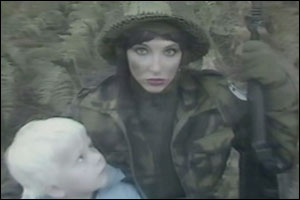
Army Dreamers reflects war’s brutality and emotional devastation from a Mother’s perspective for her deceased son, who had served in the British army. Army Dreamers emphasised emotions experienced by losing a loved one to war, why it can be a heartbreaking experience. Army Dreamers was released in late 1980, it coincidentally coincided with events leading up to the Falklands War, a conflict between Britain and Argentina over territorial occupation of the Falkland Islands. As a result the BBC, Britain’s leading radio and television broadcaster, banned songs with anti-war sentiments including Army Dreamers. It has been argued Army Dreamers’ themes were ‘poignant and imaginative in its evocation of utter waste’ [4]. This is a description which lends itself to the argument of Bush’s music containing a storytelling quality, where listeners become absorbed into the song as it explores anti-war themes:
Mourning in the aerodrome,
The weather warmer, he is colder.
Four men in uniform
To carry home my little soldier.
Bush allows listeners to engage the Mother’s grieving thought process. The Mother is so entrenched in grief that she analyses surroundings in relation to her deceased son, such as the warm weather containing a better condition than her deceased son’s corpse. This description reflects Army Dreamers containing a storytelling quality, as the lyrics place listeners subjectively within the Mother’s distress. The Mother’s nurturing instinct was conveyed in Army Dreamers‘ video by representing the decreased son as a young boy. Since Army Dreamers is from the Mother’s perspective, the deceased solider being seen as a young boy lets listeners experience the Mother’s emotional reflectivity. This is repeated in Army Dreamers’ chorus:
Should have been a rock star.
But he didn’t have the money for a guitar.
What could he do?
Should have been a politician.
But he never had a proper education.
What could he do?
Should have been a father.
But he never even made it to his twenties.
What a waste —
Army dreamers.
Army Dreamers‘ chorus reflects the Mother’s ambitions for her decreased son. He could have been successful yet circumstances played against him. These tragic repercussions play out in the video as a motif, where the Mother sees her deceased son hiding behind a tree in army uniform. The Mother runs to her deceased son, yet when reaching the tree he has disappeared, representing his death as well as opportunities he could have had. The emotional devastation of this motif enhances Army Dreamers’ storytelling quality as it lingers beyond its video. This lingering effect underlines Army Dreamers’ storytelling qualities because its themes could engage listeners beyond its lyrics and video by understanding the Mother’s emotions in context of war.

Babooshka
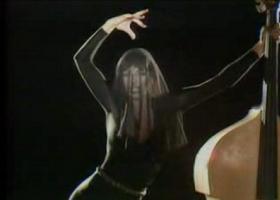
Babooshka tells the story of an older woman’s depression over losing her husband’s love writes letters to him under a pseudonym, which is her younger, vibrant self. Babooshka was a commercial success for Bush, staying in the UK Singles chart for ten weeks in the summer of 1980 and continued to show Bush’s ability to write captivating songs. Bush stated her inspiration for Babooshka was based upon period dramas she had seen, ‘I think it’s an extraordinary thing for someone to do. That’s why I found it fascinating’ [5]. Bush’s fascination for classic storytelling themes of love, deceit and deception gave her an opportunity within Babooshka to establish a story within its lyrics:
She sent him scented letters,
And he received them with a strange delight.
Just like his wife
But how she was before the tears,
And how she was before the years flew by,
And how she was when she was beautiful
Bush’s descriptive lyrics let listeners understand the characters’ personalities and deep desires. The lyrics had a melodramatic quality giving listeners a chance to emotionally engage into Babooshka‘s story. Babooshka‘s video continued to reflect its melodramatic storytelling quality, through Bush portraying the older woman in all black clothing and using theatrical body movements, reflecting her desperation to control her husband:
Capacity to give him all he needs,
Just like his wife before she freezed on him,
Just like his wife when she was beautiful.
He shouted out, I’m all yours,
Babooshka, Babooshka, Babooshka-ya-ya!
Bush enhanced Babooshka‘s melodrama by portraying the older woman’s pseudonym as a feisty young woman, her body mannerisms becoming looser reflecting the sexual freedom desired by the older woman and her husband. Bush’s use of body mannerisms as the older woman’s pseudonym allows listeners to contemplate the characters’ desire for love. Allowing contemplation enhances storytelling qualities as listeners can reflect their subjectivity onto Babooshka.

Cloudbusting

Cloudbusting was based upon the real-life account of Peter Reich’s relationship with his father William, who experimented with a weather-controlling machine. It resulted in William’s imprisonment, which Peter was deeply affected by. Cloudbusting in retrospect has been recognised as one of Bush’s significant songs, with Amy Hanson noting, ‘Safety and danger are threaded through the song, via both a thoughtful lyric and a compulsive cello-driven melody. Even more startling, but hardly surprising, is the ease with which Bush was able to capture the moment when a child first realizes that adults are fallible and the parental cocoon is tenuous at best’ [6]. Bush was able to capture Peter’s emotions by reflecting the relationship with his father with tenderness lyrically and in Cloudbusting‘s video. She noted, ‘I was very moved by the magic of it’ [7] reflecting her own enticement with Peter’s relationship with his father. Bush placing storytelling qualities into Cloudbusting was emulating emotional sensibilities she had experienced reading Peter’s story:
I still dream of Orgonon
I wake up crying, you’re making rain
And you’re just in reach
When you and sleep escape me
These lyrics are very emotive, letting listeners immediately know Peter’s emotions regarding his relationship towards his father. Cloudbusting‘s video juxapostioned the lyrics to Peter (portrayed by Bush) and his father working on the weather machine. The lyrics reflected the tenderness portrayed in Cloudbusting‘s video, letting listeners establish themselves emotionally towards the father/son relationship. Cloudbusting‘s emotive lyrics continued to absorb listeners into Peter’s relationship with his father, the latter was taken away by ‘the men in power’:
You could see them coming
You looked too small in their big, black car
To be a threat to the men in powerI hid my yo-yo in the garden
I can’t hide you from the government
Oh, God, daddy, I won’t forget
Peter’s hopelessness and fear incorporated lyrically and in Bush’s portrayal of him continued to make listeners emotionally connect to Cloudbusting. Peter’s pleas for his father as a peaceful person, undeserving of harsh treatment and imprisonment let listeners experience similar emotions Bush had felt, which reflected storytelling qualities.
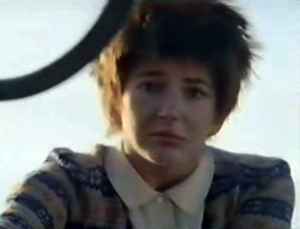
Running Up That Hill
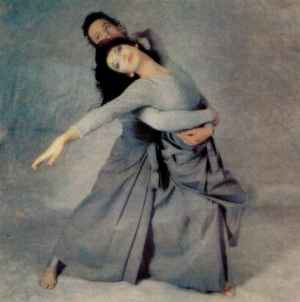
Running Up That Hillfrom a woman’s perspective reflects inevitable conflicts emerging from relationships. Listeners are immediately faced with the woman’s emotions within the relationship with her partner. Running Up That Hill had a significant impact commercially, reaching number three in the UK Singles chart becoming her most successful single in the 1980s. Bush referred to the song as, ‘I was trying to say that, really, a man and a woman, can’t understand each other because we are a man and a woman. And if we could actually swap each other’s roles, if we could actually be in each other’s place for a while, I think we’d both be very surprised!’ [8]. Running Up That Hill contemplating relationships between men and women allows for great emotional intensity, therefore creating character development for listeners to establish their subjectivity within Running Up That Hill:
It doesn’t hurt me, do you want to feel how it feels?
Do you want to know that it doesn’t hurt me?
Do you want to hear about the deal that I’m making?
Bush wants listeners to feel a direct, emotional impact of the woman attempting to find resolution. Listeners experiencing these lyrics’ emotive content can place themselves into the woman’s position, understanding the resolution she is attempting to seek. This is represented in the video through choreography between Bush and a male counterpart. The woman is trying to control her sense of self regarding her situation, yet the man entraps her in his grasp reflecting constrains within their relationship. The choreography lets listeners become subjective, therefore experiencing Running Up That Hill as a story between men and women:
Is there so much hate for the ones we love?
Tell me, we both matter, don’t we?
You, it’s you and me
It’s you and me won’t be unhappy
Listeners can relate towards the woman’s characteristics, pleading with her partner to confide with each other so that their relationship will not end. The theme of love once coincides with storytelling qualities, sending listeners on a journey with these characters by evoking emotions. These intentions were reflected in Running Up That Hill‘s video as the woman becomes lost within a crowd symbolising her partner’s mind, attempting to resolve conflict between them. It is a powerful visual effect coinciding with storytelling qualities as it creates subjective impressions upon the listener, therefore becoming part of Running Up That Hill‘s narrative.
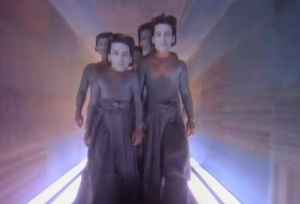
This Woman’s Work
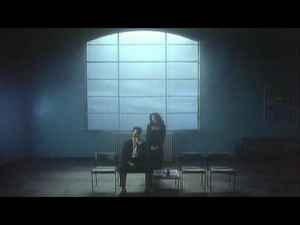
This Woman’s Work delves into the thought-process of a worried man waiting for news of his partner’s labor. Throughout the song he reflects upon his feelings for his partner. This Woman’s Work was a product of the 1989 John Hughes’ film She’s Having a Baby, based on expecting parents’ fears and feelings for their unborn child. Bush noted her intentions for This Woman’s Work, ‘it’s exploring his sadness and guilt, suddenly it’s the point where he has to grow up’ [9]. The male character being explored in terms of his past experiences and relationships creates a narrative for listeners to become engaged in:
I know you have a little life in you yet.
I know you have a lot of strength left.
I know you have a little life in you yet.
I know you have a lot of strength left.
The man’s desperation for his partner to have a safe pregnancy contains an emotional core for all listeners to be drawn into its narrative, adsorbing themselves into the story. This is reflected in the video through a montage as he waits alone in anguish, conveying the lyric’s emotional themes. This montage is followed by a sequence of scenes shared with his partner before her labor, such as a romantic moment on a winter’s night. This Woman’s Work coincides with the lyrics:
Give me these moments back.
Give them back to me.
Give me that little kiss.
Give me your hand.
Bush was emphasising an emotional intensity into This Woman’s Work, making listeners experience the man’s anguish in hoping his partner recovers. This Woman’s Work’s themes of sadness, guilt and hope abide to storytelling qualities within Bush’s music as they allowed listeners to be adsorbed into the song.
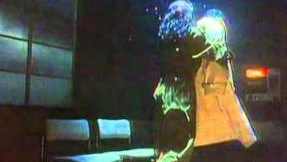
Wuthering Heights
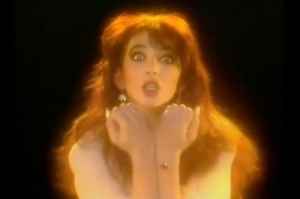
Wuthering Heightsis based upon Emily Bronte’s 1847 novel of the same name, where Bush takes Catherine’s perspective on her relationship with Heathcliff, which was a primarily plot point in the novel. ‘I’ve always been into that sort of thing, you know, and it just hung around in my head. I had to write a song about it’ [10] was Bush’s response to her influence for the song. Bush’s uniqueness of lyrical content and video representation within Wuthering Heights, her first single, was firmly establishing her musical creativity. Bush clearly saw aspects of the novel which could be explored through Wuthering Heights, therefore able to play upon the novel’s themes to emphasis storytelling qualities within her lyrics:
Out on the wiley, windy moors
We’d roll and fall in green
You had a temper like my jealousy
Too hot, too greedy
How could you leave me
When I needed to possess you
I hated you. I loved you, too
Wuthering Heights‘ opening verse is descriptive not only in capturing the novel’s eerie atmosphere, but Bush also let listeners observe Cathy’s characteristics as a jealous and love-sick woman suffering in purgatory. Wuthering Heights‘ video incorporated this as Bush portrays Cathy’s characteristics through mannerisms, capturing her possessive nature. Bush reflecting Cathy’s characteristics let the listeners subjectively enter Wuthering Heights, experiencing Cathy’s emotions:
Ooh, it gets dark! it gets lonely
On the other side from you
I pine a lot. I find the lot
Falls through without you
I’m coming back, love
Cruel Heathcliff, my one dream
My only master
Wuthering Heights‘ lyrics continued to evoke for listeners emotions within Cathy’s characteristics, suffering due to her deep love for Heathcliff. Wuthering Heights‘ video conveyed Cathy’s consumption of her love for Heathcliff in its use of split screen with Bush as Cathy. The split screen allows two Cathy’s to appear symbolising her consuming characteristics, which tortured her mind in purgatory. As with its lyrics, Wuthering Heights‘ video allowed listeners to subjectively enter its story through Cathy’s mannerisms and use of effects playing upon emotions.
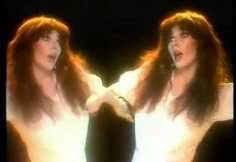
Kate Bush’s music contained the ability to reflect storytelling qualities through her lyrics and videos. Their context of intense emotions and relatable characters meant listeners could subjectively enter Bush’s songs. The storytelling quality within Bush’s music reflects opinions of music containing a timeless and mythical aspect, as listeners could place their subjective thoughts within Bush’s songs.
Listeners became moved by a song’s narrative, where characters’ suffering from grief, anguish, jealousy or love as described in harrowing detail within Bush’s lyrics helped listeners become part of the song’s narrative. The video representations of Bush’s music also played a part in letting listeners become transfixed into their stories, its emotive and striking visuals absorbing listeners. All this reveals Bush’s ability in her songwriting and videos to grant listeners indulgence into her songs, to become part of its story.
Works Cited
1. Williamson., N. 2005. “The Mighty Bush”. Scotland on Sunday
2. Moy., R. 2007. Kate Bush and Hounds of Love. Ashgate Publishing Limited.
3. Reynolds., S. 1996. The Sex Revolts: Gender, Rebellion, and Rock ‘n’ Roll. Harvard University Press.
4. See 1.
5. BBC Radio 1: ‘Saturday Live’, 25 February 1984
6. Hanson., A. N/A. ‘Cloudbusting – Kate Bush’. Almusic.com. [Online][Available From] – http://www.allmusic.com/song/cloudbusting-mt0003655152
6. Anonymous., N/A. ‘Cloudbusting: Part 2’. Gaffa.org. [Online][Available From] – http://gaffa.org/dreaming/hol_clb2.html
7. Anonymous., N/A. ‘Running Up That Hall’. Gaffa.org. [Online][Available From] – http://gaffa.org/cloud/music/running_up_that_hill.html
8. Anonymous., N/A. ‘This Woman’s Work by Kate Bush’. Songfacts.com. [Online][Available From] – http://www.songfacts.com/detail.php?id=3852
9. Thomson., G. 2010. Under The Ivy: The Life & Music of Kate Bush. Omnibus Press.
What do you think? Leave a comment.











Kate Bush….great musican with a great voice.
I loved running up that hill for 35 years. Her music and text of genius and power of expression are the best part!
You loved it for 35 years? That’s clever, considering it was first released 29 years ago 😉
My mum used to play Runnign up That Hill all the time when I was younger as it was one of her favourites when she was younger. I never fully understood the lyrics or video but know I’ve rediscovered it. I know why she talked so passionately about it.
she’s awesome I am still a bit sad I didnt get tickets to see her
As someone who has never heard of her, this article was really interesting! I actually went ahead and found some of the songs and listened to them. They sound great! Good job, and thank you!
Thanks Mo, glad to know you’ve taken an interest in Kate Bush.
legend
I think Kate would cringe if anyone dared call her the Queen of Pop. The Queen of Alternative now that’s a compliment that is well suited to her.
im so thankful that my old year 6 teacher introduced kate bush’s music to me and that he used to play the beatles in class and im 18 now, aw good old Mr fenner!
Way ahead of her time.
I live in America and became aware of Kate Bush through her back up singing on Peter Gabriel’s song Don’t Give Up. Did some research, and found her wonderful CD. MTV played Running up that hill song often. I followed the music coming out of the U.K. and Ireland and loved it, right down to The Pet Shop Boys to Simply Red, and of course Van Morrison out of Ireland. Some great music still coming from over the pond. John Newman a new favorite, Jake Bugg, etc.
Beautiful woman and singer, love her….
i could watch her dance for hours, she was big back when i was a teenager, wow feels like for ever ago
One amazing artist who dictated her own terms and appears not to have compromised too much with the viscousness of the entertainment industry. Well done to have survived it but shared the art – music – choreography.
Kate Bush – simply a stunning musician, arranger, producer, singer and everything. Though this article was in need of a proof reader!
I can assure you John, this article was proof read not only by myself but other members. May I ask in which sections you felt the article needed proof reading?
Dear Ryan,
I have copied and pasted directly from the article and added my comments as you requested:
Bush made listeners accustom towards characters of her creation – ‘made listeners accustom’? ‘accustom towards’? This does not make sense.
it coincidentally coincided – !!! You might get away with ‘coincidentally it coincided, but it still sounds very strange
Army Dreamers was released in late 1980, it coincidentally coincided with events leading up to the Falklands War… This should be 2 sentences with a full stop after 1980. Or: ‘in late 1980 when, coincidentally, it coincided’…..
yet when reaching the tree – maybe: ‘upon reaching’….or ‘yet when she reaches’… etc
Babooshka tells the story of an older woman’s depression over losing her husband’s love writes letters to him under a pseudonym – something is missing in this sentence at the point ‘love….writes’. Possibly: ‘love. She writes’…or maybe: ‘love and so she writes’…
adsorbing themselves (online dictionary: Adsorption is the adhesion of atoms, ions, or molecules from a gas, liquid, or dissolved solid to a surface) – same mistake made in later paragraph. Absorbing is what I guess you meant.
This Woman’s Work coincides with the lyrics – coincides with the lyrics? Wrong word. Concludes with? Continues with?
its emotive and striking visuals absorbing listeners – this is correct (right at the end of the article)
***
As you can see there are many examples where language, punctuation or grammar are not correct. Due to these I found the article uncomfortable to read and, in places, the meaning of a sentence was changed (‘adsorbed’, ‘coincides’). As you asked I have pointed them out for you and I hope you find my comments informative. They are simply meant to be helpful.
Regards,
John
Kate Bush is amazing. Hearing any of her music brings back so much emotion and passion. Her music truly is a gift to us all.
Always found her music difficult to dance to because I find myself sucked into the stories she tells. She has a very enchanting discography, and of course totally idiosyncratic.
I wasn’t too familiar with Kate Bush’s music, but your article is really interesting! Makes me want to check out some of her songs.
Thank you Amena
Agreed!
I love Wuthering Heights! Just reseaching it for the first time, learned a lot about it! Very helpful article, thank you.
Interesting in the use of Romantic Era literature as a muse for a song.